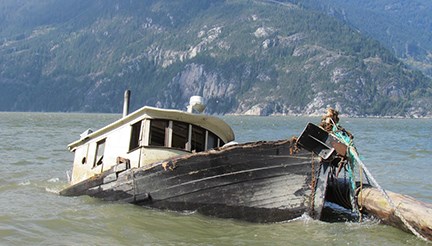If recently proposed federal legislation goes through, the buck will stop with the owners of derelict and abandoned vessels.
Transport Minister Marc Garneau introduced Bill C-64, the Wrecked, Abandoned or Hazardous Vessels Act, which makes it illegal to abandon boats.
The act strengthens owner liability for wrecks and empowers the federal government to be proactive, with individuals and corporations on the hook for their wrecks.
West Vancouver-Sunshine Coast-Sea to Sky Liberal MP Pamela Goldsmith-Jones has supported the act since last year.
Currently, owners face no penalties or fines for vessels sitting for years with fuel in their tanks, which poses a serious environmental hazard, said Garneau at a news conference.
Squamish has long had a problem with derelict and abandoned vessels in Howe Sound and in the Mamquam Blind Channel.
“We’ve had some significant issues in the last couple years from vessels leaking or sinking to major cleanup,” Mayor Patricia Heintzman told The Chief. She previously spoke at length with Garneau’s office about challenges and said this is a good start for the community and environment.
Under the federal $1.5 billion Oceans Protections Plan, the act brings into Canadian law the Nairobi Convention, a 10-year-old international agreement with rules about the removal of wrecks. Large commercial vessels will now be required to carry insurance to cover the potential cost of disposal.
The issue is complicated as maritime law falls under federal jurisdiction, said Heintzman, so currently the District has to wait until a vessel sinks before the Coast Guard can go in.
“Without the act, it ends up being whoever pulls [the boat] out of the water has the cost of dealing [with it],” she explained. “This act helps bolster the ability to be proactive and clearly puts the liability for hazardous materials on the owners.”
The District’s current Marine Action Strategy attempts to address the issue of murky jurisdiction, said Heintzman. The second phase of the strategy will determine bylaws to prevent pollution and mark the Mamquam Blind Channel to property lines “so the Coast Guard and feds have clear boundaries where the jurisdiction is and make sure waters are free of squatters.”
Coun. Doug Race said community initiatives to clean up the pilings on the channel helped last year but derelict boats are still an issue.
“There are also other vessels here, kind of squatting,” he said, acknowledging it may be a response to housing since many live on their boats. It’s problematic, however, to dump sewage into the Blind Channel.
“Federal legislation has been in place for years about not pumping out, but people aren’t adhering to that,” he said. “If they are gonna be used as a home, then there are ways of dealing,” he added, citing the solution as enforcement.
The act will not penalize owners with already abandoned vessels, Garneau said, adding ownership is difficult to determine so the federal government is trying to establish better rules for identification.
John Buchanan, local conservationist, and amateur biologist, isn’t sure the act will do much to prevent boats ending up on the ocean floor because enforcement may move problem boats into other areas and identify ownership is tricky.
He volunteers cleaning hazardous materials on abandoned ships — from lead paint to plastic — and alerts the Coast Guard or local authorities when he spots empty boats. Waiting for them to sink is a great environmental hazard, he said.
“Fines won’t help individuals,” he said, suggesting it would be better to create a coastal base that is subsidized where owners can take and leave vessels safely.
“These individuals often have no money. That’s why they live on their boats,” Buchanan said.
Financially-strapped owners feel cornered into abandoning vessels, he explained, whereas corporations can leave vessels unattended for years until selling — both can end up at the bottom of the ocean. “The end result of these ships when they decay, is eventually it ends up on your plate,” he said. “At dinner, you’re having some salmon, well, you’re eating a derelict vessel.”



